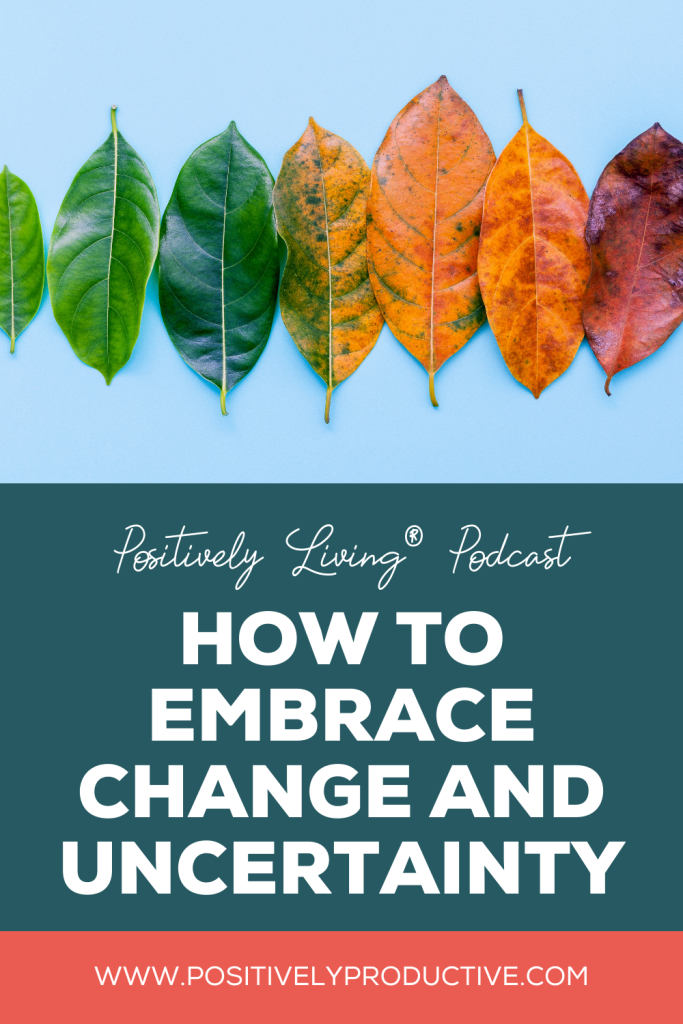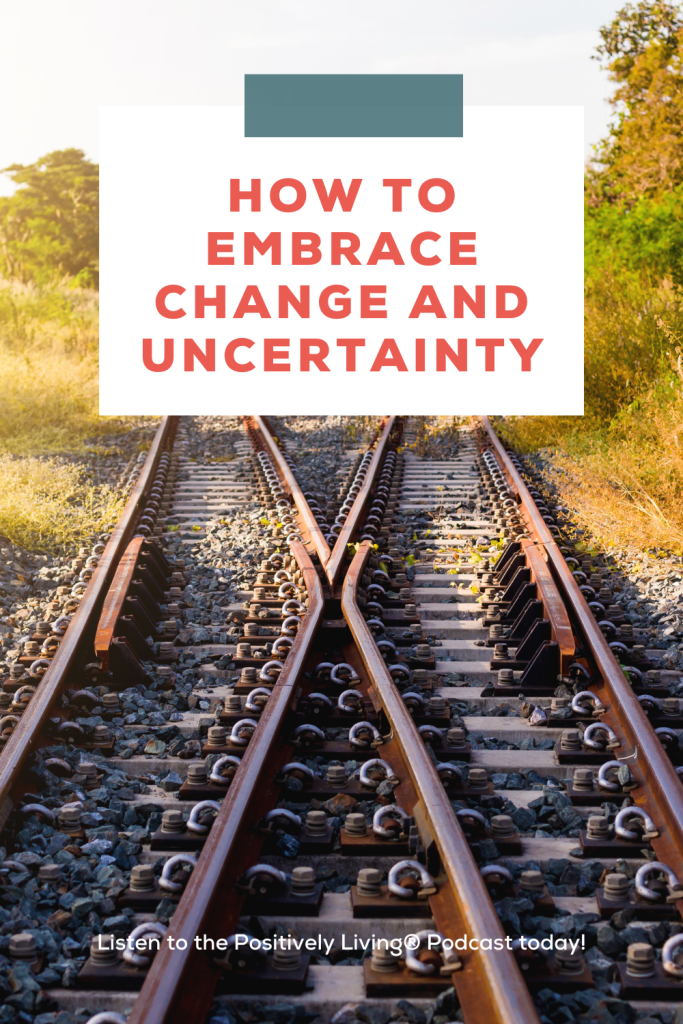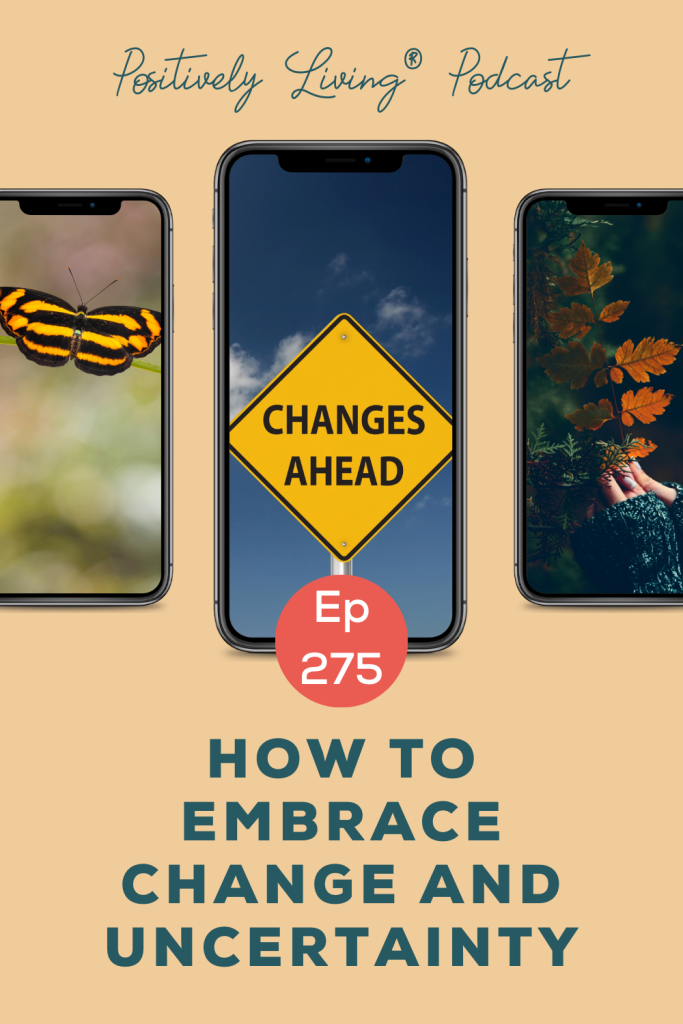Does the thought of change—whether planned or unexpected—fill you with fear and a sense of paralysis? We all naturally resist change and the uncertainty it brings, often feeling like it is easier to not move at all than to make a mistake. But what if change and uncertainty were actually opportunities for growth, resilience, and personal transformation?
In this episode of the Positively LivingⓇ Podcast, I revisit this essential topic to give you simple, actionable ways to navigate change with more confidence and curiosity. Drawing from my own experiences as a podcast host, entrepreneur, and caregiver, I share five ways to manage your relationship with change so it does not derail you, but instead helps you move forward.
I cover the following topics:
- How to reframe change as an opportunity for growth, even when it feels negative.
- The importance of focusing on what you can control, like your mindset and self-care, when so much feels uncertain.
- Why you should approach change in small, manageable steps to build momentum and allow yourself time to adapt.
- How to build and use a strong support system to help you through periods of uncertainty and hardship.
- The power of practicing self-compassion to stay resilient and keep moving forward through missteps and discomfort.
Change and uncertainty are inevitable, but they do not have to derail you. You have adapted before, and you will again. Which of these strategies will you take to heart today?
Embrace Change and Uncertainty: Your Guide to Moving Forward with Confidence
Does the thought of change—whether planned or unexpected—fill you with fear and a sense of paralysis? We all naturally resist change and the uncertainty it brings, often feeling like it is easier to not move at all than to make a mistake. But what if change and uncertainty were actually opportunities for growth, resilience, and personal transformation? What if your best self is waiting on the other side of that change?
This article is for anyone facing a big life shift, struggling to get started, or feeling overwhelmed by an uncertain future. I’ll share five simple ways to manage your relationship with change so you can move forward with more confidence and curiosity. Drawing from my own experiences as a podcast host and a caregiver, I’ll show you how to find opportunity in the unknown and make the most of it.
1. Reframe Change as an Opportunity for Growth
When change happens, it is easy to see only the negative, especially if it feels disruptive or unwanted. We often assume change is the worst thing, but this mindset can keep us stuck in fear and prevent us from seeing any positive outcomes. The biggest mistake is thinking that change is a purely negative event and that you should just try to endure it.
Instead, reframe change as a chance to learn and grow. When you see change as an opportunity, you shift from a place of fear to a place of possibility. For example, my experience as a caregiver for my mother, who had Alzheimer’s, was incredibly hard and filled with stress. However, it taught me so much that I now use in my coaching and podcasting. It gave me more patience and empathy than I ever thought possible, and I truly believe it made me a better person. As you deal with change, ask yourself, “What could this change make possible?” or “How might I grow as a result?”.
Conclusion:
- Seeing change as a chance to grow shifts your mindset from fear to possibility.
- Change, even when negative, brings opportunities for learning and growth if you are willing to look for them.
- Ask yourself what a change could make possible or what you might learn from it.
- Trust in the process that you are adapting, learning, and growing, even when it is uncomfortable.
2. Focus on What You Can Control
When a situation feels chaotic and uncertain, it is easy to feel powerless. We tend to focus on all the things we cannot control—what others think or do, the many outcomes of a situation, or the change itself. This can lead to analysis paralysis, where you feel so overwhelmed that you do not move at all.
The key is to step back and find what you actually have control over. You can control your mindset, what you choose to do next, and the way you care for yourself during the transition. Create a strong foundation with calming practices, like routines or practicing gratitude, that can hold you through the change. It is also important to acknowledge what you cannot control, so you can set clear boundaries and protect your energy from toxic outside influences. Your job is to focus on your actions, not the reactions of others.
Conclusion:
- Focusing on what is within your control gives you a strong foundation during times of uncertainty.
- You can control your mindset, your next actions, and how you care for yourself.
- Establish routines and calming practices to create stability.
- Acknowledge what you cannot control to set healthy boundaries and protect your energy.
3. Approach Change with Small, Bite-Sized Steps
When you want to make a change, the urge to do everything at once can be strong. You might feel like you need to completely overhaul your life all at once, but this is rarely a good idea. Trying to transform everything at once can lead to burnout and make the change unsustainable because you did not pace yourself.
Instead, break change down into small, manageable steps. This is just like good project management. It gives you time to adapt and allows your mind and heart to get used to the new normal. For example, the changes I have made to my podcast over the years—from my introductions to my branding—happened in small increments. Each one was small, but together, they have had a cumulative impact that has been incredibly successful. If you want to make a change, ask yourself, “What is one small step I can take today?”. Trust that those tiny steps will add up over time.
Conclusion:
- Breaking change down into small, manageable steps makes it more sustainable.
- Transforming everything at once is rarely possible and can lead to burnout.
- Approach change with micro-goals and give yourself time to adapt.
- Trust that tiny steps add up to a big cumulative impact over time.
4. Build and Use Your Support System
Change is hard, and it can feel incredibly lonely. We often hesitate to ask for help, even from those who care about us, because it can feel humbling. The mistake is thinking you have to go through it alone.
A strong support system is essential for navigating change and uncertainty. Whether it is friends, family, mentors, or a community, having people who get you can make the unknown feel less overwhelming. My family went through a financial trauma that was incredibly uncertain, and we were able to get through it with the help of a massive support system—from family helping us move to friends giving us hand-me-downs for our children. The best answer I could give my kids during that time was simply, “I have no idea where we’re going, but we’re going together”. Remember, helping others is a gift for the person helping as well as the person being helped. Do not hesitate to reach out.
Conclusion:
- You do not have to go through change alone; your support system is a vital resource.
- Building a strong network of friends, family, or mentors makes uncertainty less overwhelming.
- Trust that people want to help you, and do not be afraid to ask for support.
- Remember that helping others is a gift, so you are giving them an opportunity to help you.
5. Practice Self-Compassion
Change often brings mistakes, missteps, and a lot of discomfort. It is natural to feel awkward or even to handle it poorly sometimes. The mistake is to use these missteps as a reason to punish yourself or stop trying. This is where your inner critic can really take hold and keep you stuck.
Now is the time you need to give yourself permission to be human. Self-compassion helps you stay resilient and keeps you moving forward, even when things go wrong. It allows you to troubleshoot and course correct instead of letting mistakes hold you back. Remind yourself that mistakes are a sign that you are learning and adapting. You are not supposed to have it all figured out right away. Give yourself some grace and trust that you have adapted before, and you will again.
Conclusion:
- Giving yourself grace helps you stay resilient and move forward.
- Change can bring mistakes, missteps, and discomfort.
- Self-compassion helps you stay resilient and move forward through tough times.
- Mistakes are a sign of learning, so do not let them keep you from trying again.
Moving Forward with Confidence
Change and uncertainty are inevitable, but they do not have to derail you. By seeing them as an opportunity for growth, focusing on what you can control, taking small steps, seeking support, and giving yourself grace, you can navigate seasons of change with more ease and confidence. You have adapted before, and you will again.
Your Action Plan:
- Reframe: Think about a change you are facing and ask, “What could this make possible?”.
- Focus: Identify one thing you can control right now and take action on it.
- Start Small: Choose one small step you can take today toward a change you want to make.
- Connect: Reach out to one person in your support system and share your fears or feelings about a change.
- Give Grace: Remind yourself that mistakes are part of the learning process and give yourself permission to be human.
I am sending you so much encouragement. Take a breath, take heart, and remember, you have adapted before and you will again.
Thank you for listening! If you enjoyed this episode, take a screenshot of the episode to post in your stories and tag me! And don’t forget to follow, rate, and review the podcast and tell me your key takeaways!
Learn more about Positively LivingⓇ and Lisa at https://positivelyproductive.com/podcast/
Could you use some support? The Quickstart Coaching session is a way to get to know your productivity path, fast! A speed-round strategy session is perfect for a quick win and to see what coaching can do, the Quickstart will encourage and inspire you to take intentional, effective action! Go to https://www.positivelyproductive.com/plpquick for a special listener discount!
CONNECT WITH LISA ZAWROTNY:
LINKS MENTIONED IN THIS EPISODE:
(Find links to books/gear on the Positively Productive Resources Page.)
Dance Song Playlist V1, V2, V3
Music by Ian and Jeff Zawrotny
Start your own podcast with Buzzsprout!











